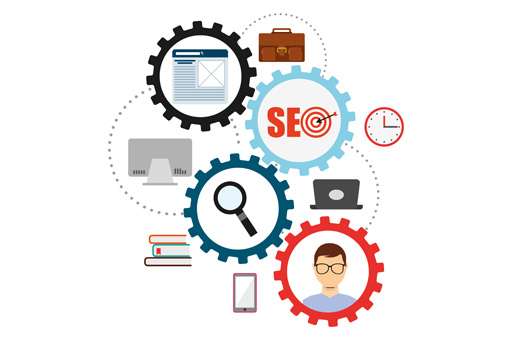Search engine optimization (SEO) has been an essential part of digital marketing since the early days of the internet. It involves optimising websites to improve their rankings on search engine results pages (SERPs), which leads to increased traffic and revenue. However, Automation and Its Impact on Search Engine Optimization is the future. And due to rapid change in automation is revolutionising the industry.

Automation tools use machine learning algorithms to analyse web pages, identify improvement areas, and deliver accurate & fast results.
One of the most significant ways of automation changing the future of SEO is through multiple tools for multiple SEO tasks—Like-Keyword Analysis, Website Audit (Analysis), Competitor Analysis, etc. Keyword research is a critical component of SEO, and it involves identifying the words and phrases people are searching for online.Content Creation
Automation tools such as Natural Language Generation (NLG) are being used to create content. NLG tools can create unique and relevant content at scale, which can be useful for websites that regularly generate a large volume of content.
Keyword Research
Keyword research is a crucial component of SEO. Automation tools such as keyword research software can help SEO professionals quickly and efficiently identify the most relevant keywords for their content.
Technical SEO
Automation tools can help identify technical SEO issues on websites, such as broken links, missing alt tags, and slow-loading pages. These tools can save SEO professionals time and allow them to focus on more strategic tasks.
Data Analysis
Automation tools can help SEO professionals analyse data quickly and efficiently. Tools such as Google Analytics and SEMRush can provide valuable insights into website traffic, keyword rankings, and other essential metrics.
Link Building
Automation tools are being used to identify potential link-building opportunities, monitor backlinks, and track competitor backlinks. This helps SEO professionals to build high-quality backlinks more efficiently.

A variety of SEO automation tools are mentioned here that can help you streamline and optimise various aspects of your SEO strategy. Some popular examples include:
SEMrush
This tool offers SEO features, including keyword research, backlink analysis, on-page optimization, and competitor research.
Ahrefs
This tool primarily focuses on backlink analysis and includes features for keyword research, content analysis, and site audits.
Moz Pro
This tool offers features for keyword research, site audits, on-page optimization, and backlink analysis.
Google Analytics
While not an SEO tool, Google Analytics provides valuable insights into website traffic and user behaviour that can inform your SEO strategy.
Yoast SEO
This WordPress plugin provides on-page optimization recommendations and can help ensure your content is properly optimised for search engines.
Let’s discuss the several benefits of automation in SEO, including:
Increased efficiency
Automation can help streamline repetitive tasks, such as keyword research, content optimization, and link building, allowing SEO professionals to focus on higher-level strategy and analysis.Improved accuracy
Automated tools can reduce the risk of human error, ensuring that SEO tasks are complete, accurate, and consistent.Time-saving
Automation can help SEO professionals save time by reducing the amount of manual work required for routine tasks.Cost-effective
Automated SEO tools can be more cost-effective than hiring a team of SEO professionals to complete tasks manually.Scalability
Automation can help businesses scale their SEO efforts by allowing them to quickly and efficiently execute tasks across multiple websites or pages.Data analysis
Automated tools can provide valuable data and insights into SEO performance, allowing businesses to make informed decisions and adjust their strategy accordingly.
While automation can offer several benefits for SEO, such as saving time and increasing efficiency, there are also some potential disadvantages. Some of the disadvantages of automation in SEO include the following:
Lack of flexibility
Automated SEO tools are designed to follow a set of rules and instructions. While this can help save time and reduce errors, it can also limit the ability to adapt to changes in search engine algorithms or user behaviour.
Over Reliance on data
Automated SEO tools often rely heavily on data and metrics to make decisions, which can lead to a lack of context or understanding of the overall goals and strategy of the website.
Risk of penalties
Some automated SEO tools may use tactics that violate search engine guidelines, such as keyword stuffing or link schemes. These tactics can lead to penalties or even a ban from search engines.
Lack of personal touch
Automated SEO tools may need to provide the level of customization and personalization that a human SEO expert can offer, such as understanding a business’s specific needs and goals.
Potential for errors
While automation can help reduce errors, it is not foolproof. Errors in data entry or programming can lead to mistakes in SEO efforts, negatively impacting search rankings and traffic.
Overall, automation is transforming the SEO industry by making it faster, more efficient, and more effective. It helps SEO professionals in Chandigarh to save their time, reduce costs, and improve their results by using keyword optimization tools, on-page SEO tools, and SEO automation tools. As the technology continues to evolve, the future of SEO will undoubtedly become even more automated, with SEO professionals increasingly relying on machine learning algorithms to optimise websites for search engines.














0 Comments